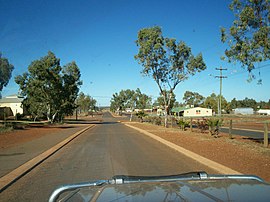Wiluna, Western Australia
|
Wiluna Western Australia |
|||||||
|---|---|---|---|---|---|---|---|

Main Street in Wiluna
|
|||||||
| Coordinates | 26°35′42″S 120°13′30″E / 26.59500°S 120.22500°ECoordinates: 26°35′42″S 120°13′30″E / 26.59500°S 120.22500°E | ||||||
| Population | 681 (2006 census) | ||||||
| Established | 1898 | ||||||
| Postcode(s) | 6646 | ||||||
| Elevation | 521 m (1,709 ft) | ||||||
| Location |
|
||||||
| LGA(s) | Shire of Wiluna | ||||||
| State electorate(s) | Kalgoorlie | ||||||
| Federal Division(s) | Durack | ||||||
|
|||||||
Wiluna is a town in the Mid West region of Western Australia. It is situated on the edge of the Western Desert at the gateway to the and Gunbarrel Highway. It is the service centre of the local area for the local Aboriginal people, the pastoral industry, the Wiluna Gold Mine, and many more people who work on other mines in the area on a "fly-in/fly-out" basis. Wiluna's climate is hot and dry, with an annual rainfall of 254 mm (10 in). Mean maximum temperatures range from 19 °C (66 °F) in July, to 38 °C (100 °F) in January.
Wiluna has from 200 to 600 Indigenous (Aboriginal) people living within its community depending upon the nature, time and place of the traditional law ceremonies across the Central Desert region.
The traditional Aboriginal owners were "settled" as a consequence of the British colonisation process that began in the 1800s. In the 1950s a church based group were supported by the government of the day to establish a mission. The traditional people lost their lands through many different processes, including the issuing of pastoral leases, the discovery of gold and the influx of non Aboriginal people onto their lands.
Before and after the atomic nuclear testing near Maralinga in the 1950s, many Aboriginal people from at least three different tribal and language groups were "forced" to live within the mission site. This created many conflicts and the legacy continues today. Much traditional knowledge and skill exists today amongst the Aboriginal residents and visitors.
The existence of a local pub has created much conflict with many people opposed to its presence arising from the conflict and trauma associated with alcohol abuse. The town also has a general store, petrol, caravan park, sports oval, school, health clinic, shelter and more.
Local water holes, much damaged and overused after years of cattle use, provide relief from the hot summer days.
The roads are unsealed and in the wet season the land may fill with large bodies of water. Large lakes may form that attract an array of wildlife. The region has snakes, kangaroos, bungarras (large lizard/goanna), bush turkeys, donkeys, horses, camels and dingoes.
Willuna is home to VMW, a marine weather transmitter operated by the Bureau of Meteorology.
...
Wikipedia

